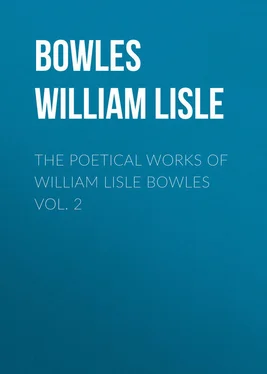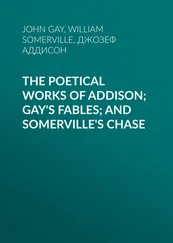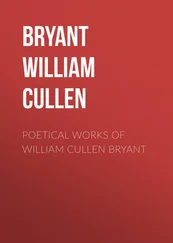William Bowles - The Poetical Works of William Lisle Bowles Vol. 2
Здесь есть возможность читать онлайн «William Bowles - The Poetical Works of William Lisle Bowles Vol. 2» — ознакомительный отрывок электронной книги совершенно бесплатно, а после прочтения отрывка купить полную версию. В некоторых случаях можно слушать аудио, скачать через торрент в формате fb2 и присутствует краткое содержание. ISBN: , Жанр: foreign_antique, foreign_prose, foreign_poetry, на английском языке. Описание произведения, (предисловие) а так же отзывы посетителей доступны на портале библиотеки ЛибКат.
- Название:The Poetical Works of William Lisle Bowles Vol. 2
- Автор:
- Жанр:
- Год:неизвестен
- ISBN:http://www.gutenberg.org/ebooks/32145
- Рейтинг книги:4 / 5. Голосов: 1
-
Избранное:Добавить в избранное
- Отзывы:
-
Ваша оценка:
- 80
- 1
- 2
- 3
- 4
- 5
The Poetical Works of William Lisle Bowles Vol. 2: краткое содержание, описание и аннотация
Предлагаем к чтению аннотацию, описание, краткое содержание или предисловие (зависит от того, что написал сам автор книги «The Poetical Works of William Lisle Bowles Vol. 2»). Если вы не нашли необходимую информацию о книге — напишите в комментариях, мы постараемся отыскать её.
The Poetical Works of William Lisle Bowles Vol. 2 — читать онлайн ознакомительный отрывок
Ниже представлен текст книги, разбитый по страницам. Система сохранения места последней прочитанной страницы, позволяет с удобством читать онлайн бесплатно книгу «The Poetical Works of William Lisle Bowles Vol. 2», без необходимости каждый раз заново искать на чём Вы остановились. Поставьте закладку, и сможете в любой момент перейти на страницу, на которой закончили чтение.
Интервал:
Закладка:
PART THIRD
I subjoin the plain narrative of the singular event on which this tale is founded, from Mr Polwhele, that the reader may see how far, poetically , I have departed from plain facts, and what I have thought it best to add for the sake of moral, picturesque, and poetical effect. The narrative is as follows: —
"October, 1780. Thomas Thomas, aged 37. This man died of mental anguish, or what is called a broken heart. He lived in the village of Drannock, in the parish of Gwinnear, till an unhappy event occurred, which proved fatal to his peace of mind for more than eight years, and finally occasioned his death. He courted Elizabeth Thomas, of the same village, who was his first-cousin; and it was understood that they were under a matrimonial engagement. But in May 1772, some little disagreement having happened between them, he, out of resentment, or from some other motive, paid great attention to another girl; and on Sunday the 31st of that month, in the afternoon, accompanied her to the Methodist meeting at Wall. During their absence, the slighted female, who was very beautiful in her person, but of an extremely irritable temper, took a rope and a common prayer-book, in which she had folded down the 109th Psalm, and, going into an adjacent field, hanged herself. Thomas, on his return from the preaching, inquired for Betsy; and being told she had not been seen for two or three hours, he exclaimed, 'Good God! she has destroyed herself!' which apprehension seems to show, either that she had threatened to commit suicide in consequence of his desertion, or that he dreaded it from a knowledge of the violence of her disposition. But when he saw that his fears were realised, and had read the psalm, so full of execrations, which she had pointed out to him, he cried out, 'I am ruined for ever and ever!' The very sight of this village and neighbourhood was now become insupportable, and he went to live at Marazion, hoping that a change of scene and social intercourse might expel those excruciating reflections which harrowed up his very soul, or at least render them less acute; but in this he appeared to be mistaken, for he found himself closely pursued by the evil demon
'Despair, whose torments no man, sure,
But lovers and the damned endure.'
"To hear the 109th Psalm would petrify him with horror, and therefore he would not attend divine service on the 22d day of the month; he dreaded to go near a reading school, lest he should hear the dreaded lesson. Whatever misfortunes befel him (and these were not a few, for he was several times hurt, and even maimed, in the mines in which he laboured), he still attributed them all to the malevolent agency of the deceased, and thought he could find allusions to the whole in the calamitous legacy which she had bequeathed him. When he slumbered, for he knew nothing of sound sleep, the injured girl appeared to his imagination, with such a countenance as she retained after the rash action, and the prayer-book in her hand, open at the hateful psalm; and he was frequently heard to cry out, 'Oh, my dear Betsy, shut the book, shut the book!' etc. With a mind so disturbed and deranged, though he could not reasonably expect much consolation from matrimony, yet imagining that the cares of a family might distract his thoughts from the miserable subject by which he was harassed both by day and night, he successively paid his addresses to many girls of Marazion; but they indignantly flew from him, and with a sneer asked him, whether he was desirous of bringing all the curses in the 109th Psalm on their heads? At length, however, he succeeded with one who had less superstition and more fortitude than the rest, and he led her to St Hilary church, to be married, January 21, 1778; but on the road thither, they were overtaken by a sudden and violent hurricane, such as those which not unfrequently happen in the vicinity of Mount's Bay; and he, suspecting that poor Betsy rode the whirlwind and directed the storm, was convulsed with terror, and was literally 'coupled with fear.' Such is the power of conscious guilt to impute accidental occurrences to the hand of vindictive justice, and so true is the observation of the poet,
'Judicium metuit sibi mens mali conscia justum.'
"He lived long enough to have a son and a daughter; but the corrosive worm within his breast preyed upon his vitals, and at length consumed all the powers of his body, as it had long before destroyed the tranquillity of his mind, and he was released from all his pangs, both mental and corporeal, on Friday, October 20, 1780, and buried at St Hilary, the Sunday following, during evening service."
Oh! shut the book, dear Mary, shut the book!
So William cried, with wild and frantic look.
She whom he loved was in her shroud, nor pain
Nor grief can visit her sad heart again.
There is no sculptured tombstone at her head;
No rude memorial marks her lowly bed:
The village children, every holiday,
Round the green turf, in summer sunshine play;
And none, but those now bending to the tomb,
Remember Mary, lovely in her bloom!
Yet oft the hoary swain, when autumn sighs
Through the long grass, sees a dim form arise,
That hies in glimmering moonlight to the brook,
Its wan lips moving, in its hand a book.
So, like a bruised flower, and in the pride
Of youth and beauty, injured Mary died.
William some years survived, but years no trace
Of his sick heart's deep anguish could erase.
Still the dread spectre seemed to rise, and, worse,
Still in his ears rang the appalling curse!
While loud he cries, despair upon his look,
Oh! shut the book, my Mary, shut the book!
The sun is slowly westering now, and lo,
How beautiful steals out the humid bow,
A radiant arch! Listen, whilst I relate
William's dread judgment, and poor Mary's fate.
I think I see the pine, that, heavily
Swaying, yet seems as for the dead to sigh.
How many generations, since the day
Of its green pride, have passed, like leaves, away!
How many children of the hamlet played
Round its hoar trunk, who at its feet were laid,
Withered and gray old men! In life's first bloom
How many has it seen borne to the tomb!
But never one so sunk in hopeless woe
As she who lies in the cold grave below.
Her Sabbath-book, from which at church she prayed,
Was her poor father's, in that churchyard laid:
For Mary grew as beautiful in youth,
As taught at church the lore of heavenly truth.
What different passions in her bosom strove,
When first she heard the tale of village love!
The youth whose voice then won her partial ear,
A yeoman's son, had passed his twentieth year;
She scarce eighteen: her mother, with the care
Of boding age, oft whispered, Oh, beware!
For William was a thoughtless youth, and wild,
And like a colt unbroken, from a child:
At length, if not to serious thoughts awake,
He came to church, at least for Mary's sake.
Young Mary, while her father was alive,
Saw all things round the humble dwelling thrive;
Her widowed mother now was growing old,
And bit by bit their worldly goods were sold:
Mary remained, her mother's hope and pride!
How oft when she was sleeping by her side,
That mother waked, and kissed her cheek, with tears
Praying for blessings on her future years, —
When she, her mother, earthly trials o'er,
Should rest in the cold grave, to grieve no more!
But Mary to love's dream her heart resigned,
And gave to fancy all her youthful mind.
Shall I describe her! Didst thou never mark
A soft blue light, beneath eye-lashes dark?
Such was her eye's soft light; – her chestnut hair,
Light as she tripped, waved lighter to the air;
And, with her prayer-book, when on Sunday dressed,
Her looks a sweet but lowly grace expressed,
As modest as the violet at her breast.
Sometimes all day by her lone mother's side
She sat, and oft would turn, a tear to hide.
Where winds the brook, by yonder bordering wood,
Her mother's solitary cottage stood:
A few white pales in front, fenced from the road
The garden-plot, and poor but neat abode.
Before the window, 'mid the flowers of spring
A bee-hive hummed, whose bees were murmuring;
Beneath an ivied bank, abrupt and high,
A small clear well reflected bank and sky,
In whose translucent mirror, smooth and still,
From time to time, a small bird dipped its bill.
Here the first bluebell, and, of livelier hue,
The daffodil and polyanthus grew.
'Twas Mary's care a jessamine to train.
With small white blossoms, round the window-pane:
A rustic wicket opened to the meads,
Where a scant pathway to the hamlet leads:
And near, a water-wheel toiled round and round,
Dashing the o'ershot stream, with long continuous sound.
Beyond, when the brief shower had sailed away,
The tapering spire shone out in sunlight gray;
And o'er that mountain's northern point, to sight
Stretching far on, the main-sea rolled in light.
Enter: within, see everything how neat!
One book lies open on the window-seat,
The spectacles are on a leaf of Job:
There, mark, a map of the terrestrial globe;
And opposite, with its prolific stem,
The Christian's tree, and New Jerusalem; 50 50 Large coloured prints, in most cottages.
Here, see a printed paper, to record
A veritable letter from our Lord: 51 51 The letter said to be written by our Saviour to King Agbarus is seen in many cottages.
Two books are on the window-ledge beneath, —
The Book of Prayer, and Drelincourt on Death:
Some cowslips, in a cup of china placed,
A painted shelf above the chimney graced:
Grown like its mistress old, with half-shut eyes,
Save when, at times, awaked by wandering flies,
Tib 52 52 Tib, the cat.
in the sunshine of the casement lies.
'Twas spring time now, with birds the garden rung,
And Mary's linnet at the window sung.
Whilst in the air the vernal music floats,
The cuckoo only joins his two sweet notes: 53 53 The notes of the cuckoo are the only notes, among birds, exactly according to musical scale. The notes are the fifth, and major third, of the diatonic scale.
But those – oh! listen, for he sings more near —
So musical, so mellow, and so clear!
Not sweeter, where thy mighty waters sweep,
Missouri, through the night of forests deep,
Resounds, from glade to glade, from rock to hill,
While fervent harmonies the wild wood fill,
The solitary note of "whip-poor-will;" 54 54 The "whip-poor-will" is a bird so called in America, from his uttering those distinct sounds, at intervals, among the various wild harmonies of the forest. See Bertram's Travels in America.
Mary's old mother stops her wheel to say,
The cuckoo! hark! how sweet he sings to-day!
It is not long, not long to Whitsuntide,
And Mary then shall be a happy bride.
On Sunday morn, when a slant light was flung
Upon the tower, and the first peal was rung,
William and Mary smiling would repair,
Arm linked in arm, to the same house of prayer.
The bells will sound more merrily, he cried,
And gently pressed her hand, at Whitsuntide:
She checked the rising thoughts, and hung her head;
And Mary, ere one year had passed – was dead!
'Twas said, and many would the tale believe,
Her shrouded form was seen upon that eve, 55 55 In Cornwall, and in other countries remote from the metropolis, it is a popular belief, that they who are to die in the course of the year appear, on the eve of Midsummer, before the church porch. See an exquisite dramatic sketch on this subject, called "The Eve of St Mark," in Blackwood.
When, gliding through the churchyard, they appear —
They who shall die within the coming year.
All pale, and strangely piteous, was her look,
Her right hand was stretched out, and held a book;
O'er it her wet hair dripped, while the moon cast
A cold wan light, as in her shroud she passed!
I cannot say if this were so, but late,
She went to Madern-stone, 56 56 Madern-stone, a Druidical monument in the village of Madern, to which the country people often resort, to learn their future destinies.
to learn her fate,
What there she heard ne'er came to human ears —
But from that hour she oft was seen in tears.
Mild zephyr breathes, the butterfly more bright
Strays, wavering, o'er the pales, in rainbow light;
The lamb, the colt, the blackbird in the brake,
Seem all the vernal feeling to partake;
The lark sings high in air, itself unseen,
The hasty swallow skims the village-green;
And all things seem, to the full heart, to bring
The blissful breathings of the world's first spring.
How lovely is the sunshine of May-morn!
The garden bee has wound his earliest horn,
Busied from flower to flower, as he would say,
Up! Mary! up this merry morn of May!
Now lads and lasses of the hamlet bore
Branches of blossomed thorn or sycamore; 57 57 Such is the custom in Cornwall.
And at her mother's porch a garland hung,
While thus their rural roundelay they sung: —
Интервал:
Закладка:
Похожие книги на «The Poetical Works of William Lisle Bowles Vol. 2»
Представляем Вашему вниманию похожие книги на «The Poetical Works of William Lisle Bowles Vol. 2» списком для выбора. Мы отобрали схожую по названию и смыслу литературу в надежде предоставить читателям больше вариантов отыскать новые, интересные, ещё непрочитанные произведения.
Обсуждение, отзывы о книге «The Poetical Works of William Lisle Bowles Vol. 2» и просто собственные мнения читателей. Оставьте ваши комментарии, напишите, что Вы думаете о произведении, его смысле или главных героях. Укажите что конкретно понравилось, а что нет, и почему Вы так считаете.












